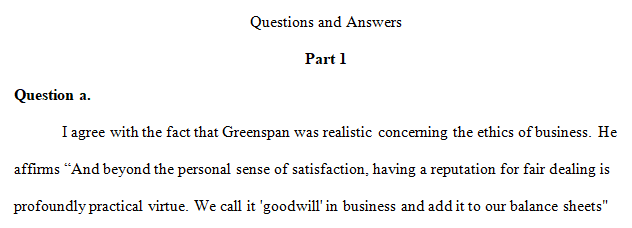
Do you think Greenspan is being realistic about the possibility of business ethics?
Questions and Answers
Required Readings:
https://www.federalreserve.gov/boarddocs/speeches/1999/199906102.htm
Please focus on these four paragraphs:
[1] “I do not deny that many appear to have succeeded in a material way by cutting corners and manipulating associates, both in their professional and in their personal lives. But material success is possible in this world and far more satisfying when it comes without exploiting others. The true measure of a career is to be able to be content, even proud, that you succeeded . . . without leaving a trail of casualties in your wake.”
[2] “I cannot speak for others whose psyches I may not be able to comprehend, but, in my working life, I have found no greater satisfaction than achieving success through honest dealings and strict adherence to the view that for you to gain, those you deal with should gain as well. Human relations–be they personal or professional–should not be zero sum games.”
[3] “And beyond the personal sense of satisfaction, having a reputation for fair dealing is a profoundly practical virtue. We call it ‘good will’ in business and add it to our balance sheets.”
[4] “Trust is at the root of any economic system based on mutually beneficial exchange. In virtually all transactions, we rely on the word of those with whom we do business. Were this not the case, exchange of goods and services could not take place on any reasonable scale. Our commercial codes and contract law presume that only a tiny fraction of contracts, at most, need be adjudicated. If a significant number of businesspeople violated the trust upon which our interactions are based, our court system and our economy would be swamped into immobility.”
Questions:
[a] Do you think Greenspan is being realistic about the possibility of business ethics? Cite specific language from his speech (in quotation marks) and explain your reasoning.
[b] Identify the core ethical v
alues you plan to follow in your career.
Required Reading:
http://www.theatlantic.com/doc/200510/lincolns-clinical-depression
Questions:
[a] Based on your reading of Shenk’s article, “Lincoln’s Great Depression”, please identify two of Lincoln’s most successful adaptation strategies (skills, habits, or ways of thinking) that helped him use his struggle with depression to accomplish worthy goals. Provide textual evidence (e.g. quotations) to support your answer.
b] What idea or insight in the full article would you recommend to others (a friend, perhaps)? Provide a direct quotation from the article to support your answer.
The great abolitionist Frederick Douglass challenged and admired Lincoln. Both men eventually formed https://wapo.st/2ZnpFYf leading to the abolition of slavery.
Required Readings (two speeches by Frederick Douglass):
https://teachingamericanhistory.org/library/document/oration-in-memory-of-abraham-lincoln/
(1876)
https://docs.google.com/document/d/1HysKdK-sYazaxIf-0VB_S4bRcBHl3ccQIla-nsiyiB0/edit?usp=sharing
(1869) (Excerpts)
Questions:
[a] Based on the two assigned speeches from Douglass, what characteristics does he display as a thinker and a writer? (People continue to read these speeches because they’re powerful and memorable. What makes them powerful and memorable?) Cite a specific example from each speech to support your answer.
[b] Leading a life of integrity: based on the readings in both assignments above, please identify at least one quality of character exhibited by Lincoln and Douglass you might wish to cultivate in yourself.
First, please read Book One of the Meditations of Roman Emperor and Stoic philosopher Marcus Aurelius (link below).
https://plato.stanford.edu/entries/stoicism/
Additional background for reflection: a philosophical perspective on gratitude…
“Aware only of his own satisfactions and his own happiness, hoarding them as a miser hoards his coin . . . the egoist cannot be grateful. Ingratitude is not the incapacity to receive but the inability to give back–in the form of joy or love–a little of the joy that was received or experienced. This is why ingratitude is so pervasive a vice. [Ungrateful people] absorb joy as others absorb light, for egoism is a black hole.”
–Andre Comte-Sponville, Professor of philosophy at the Sorbonne (France)
Questions:
[a] Write a concise statement of gratitude (400 words or less) identifying the ethical and intellectual debts you owe to family members, teachers, or friends. Fictitious names are permitted, but the statement of gratitude should be genuine
Please pretend you’re at a retirement banquet. This is a serious and formal occasion, not a “roast.” The person retiring is 65 years old and at the end of a long career. You know this person well–both inside and outside the workplace. It’s your job to say a few truthful, descriptive words about them. What character or personality traits come to mind?
Pretend the person retiring is you. In short, we’re asking you to project yourself into the future and to identify at least five descriptive words you hope others would say about you at a comparable event. By “descriptive words” we mean single words or very short phrases. Please number each descriptive word or phrase and rank them in priority order ( #1 = the most important to you).
Subject: Masters Law
HelIo, I am an international student. I don’t want the answers to be a model. I want them to be simple
Answer preview……………….
 apa 2159 words
apa 2159 words